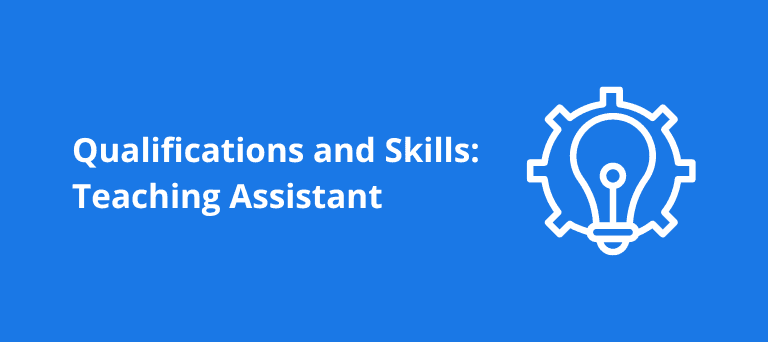Deborah A., Primary School Teacher
17 Aug 2023
5
min read

Qualifications and Skills Needed to Become a Teaching Assistant in the UK
Are you passionate about igniting young minds and supporting students on their educational journey? If so, embarking on a career as a Teaching Assistant could be the perfect fit for you
In this post, we'll delve into the qualifications and skills necessary to become a sought-after Teaching Assistant in the UK. Whether you're starting fresh or considering a career change, we'll guide you through the essential steps to make your dream a reality.
What is a Teaching Assistant?
Let's take a moment to understand the invaluable role of a Teaching Assistant (TA). A Teaching Assistant is a vital member of the education team, working closely with teachers to provide support and enhance the learning experience for students.
TAs assist in various classroom activities, such as preparing materials, guiding individual or small groups of students, and helping to maintain a positive and inclusive learning environment. They also play a crucial role in promoting student engagement, addressing individual learning needs, and ensuring the smooth functioning of the classroom.
Why Become a Teaching Assistant in the UK?
Choosing to become a Teaching Assistant in the UK opens doors to a rewarding career that impacts the lives of young learners. Here are a few compelling reasons why individuals are drawn to this profession:
1. Making a Difference
Teaching Assistants have the opportunity to positively influence students' lives by providing individualised support, instilling confidence, and helping them overcome challenges. Witnessing a student's progress and growth is immensely fulfilling.
2. Passion for Education
Many Teaching Assistants have a genuine passion for education and a desire to contribute to the learning process. By working closely with teachers, they actively participate in shaping young minds and fostering a love for learning.
3. Career Development
Becoming a Teaching Assistant can serve as a stepping stone towards a career in education. It provides valuable experience, insights into classroom dynamics, and the opportunity to explore teaching as a future career path.
4. Personal Satisfaction
The role of a Teaching Assistant allows for daily personal satisfaction, knowing that you are making a significant impact on the educational journey of students. And the sense of fulfilment derived from helping students achieve their potential is immeasurable.
Basic Qualifications Needed to Become a Teaching Assistant in the UK
While there isn't a strict set of qualifications required to become a Teaching Assistant in the UK, having a solid educational background can significantly enhance your chances of securing a position. Many schools prefer candidates who have achieved a minimum of five GCSEs (or equivalent) at grades 9 - 4 (A*-C), including English and Mathematics.
Additionally, obtaining relevant qualifications such as a Level 2 or Level 3 Certificate in Supporting Teaching and Learning in Schools can give you an edge. These courses provide valuable knowledge and skills related to supporting teachers in the classroom, understanding child development, and fostering positive behaviour.
Some colleges and universities even offer foundation degrees or higher-level qualifications in education support, which can further strengthen your profile and open doors to advancement opportunities.
Top Skills Needed to Become a Teaching Assistant in the UK
Beyond formal qualifications, possessing certain skills is vital for excelling as a Teaching Assistant. Let's explore some of the key skills that will empower you in this role:
1. Effective Communication
As a Teaching Assistant, your ability to communicate clearly and empathetically is crucial. Strong verbal and written communication skills allow you to convey information effectively, actively listen to students' concerns, and collaborate harmoniously with teachers and colleagues.
2. Patience and Empathy
Each student has unique learning needs and challenges. Cultivating patience and empathy enables you to provide individualised support, address students' difficulties with care, and create a nurturing learning environment where every child feels valued and understood.
3. Organisational Mastery
Teaching Assistants often assist with lesson planning, classroom organisation, and administrative tasks. Exceptional organisational skills help you stay on top of responsibilities, ensuring a smoothly running classroom that supports effective teaching and learning.
4. Adaptability
Flexibility is key in the dynamic classroom environment. Being adaptable allows you to navigate unexpected challenges, adjust your approach to cater to diverse learning styles, and create an inclusive environment where all students can thrive.
5. Team Player Mentality
Collaboration lies at the heart of being a successful Teaching Assistant. Working harmoniously with teachers, fellow Teaching Assistants, and support staff is essential. Embracing a team player mentality and actively participating in discussions and idea-sharing can contribute to a positive and cooperative learning environment.
How to Gain Experience As An Aspiring Teaching Assistant in the UK
While qualifications and skills are crucial, gaining practical experience can give you a significant advantage when pursuing a Teaching Assistant position. Consider the following avenues to gain valuable experience:
1. Volunteer Work
Offer your assistance at local schools, youth organisations, or community centres. Volunteering allows you to observe classroom dynamics, engage with students, and establish meaningful connections within the education sector.
2. Work Placements
Some educational institutions provide work placement opportunities for aspiring Teaching Assistants. These placements offer hands-on experience, enabling you to develop your skills under the guidance of experienced professionals.
3. Training Courses
Attend relevant workshops, training sessions, or online courses to enhance your knowledge and skills. These opportunities not only enrich your resume but also demonstrate your commitment to continuous professional development.
4. Networking
Connect with professionals in the education field through networking events, conferences, or online communities. Building relationships and seeking mentorship can provide valuable insights and guidance as you progress in your Teaching Assistant career.
Conclusion
Becoming a Teaching Assistant in the UK can be an immensely rewarding career choice for those who have a genuine passion for education. While specific qualifications may vary, a solid educational background, relevant certifications, and a comprehensive set of skills are key to unlocking your potential in this role.
Remember to seek practical experience through volunteering, work placements, and training courses to further bolster your prospects. Embrace the opportunity to make a positive impact on students' lives and contribute to their educational journey.



